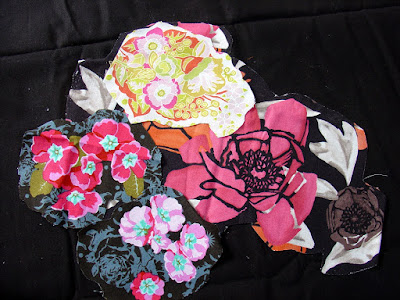Needle-turn applique has never been one of my favourite techniques,
but I really wanted a feature for the centre of a Chris Jurd quilt I'm attempting at present.
I love all the inspiration Adrianne shared in her QuiltCon post a while ago,
in particular, anna maria horner's mod corsage block featuring fussy cutting, appliqué and broderie perse.
I'm thinking a bit of improv 'mod corsage' could be perfect for my little centre piece!
I love all the inspiration Adrianne shared in her QuiltCon post a while ago,
in particular, anna maria horner's mod corsage block featuring fussy cutting, appliqué and broderie perse.
I'm thinking a bit of improv 'mod corsage' could be perfect for my little centre piece!
Keen to find out more about that form of applique called Broderie Perse,
I did a quick search and here's what I discovered...
I did a quick search and here's what I discovered...
Traditional Broderie Perse is harder today
because large-scale florals with white backgrounds are rare, e.g. like the old chintz florals.
And I read, one of the secrets for success
is to find a perfect match in the color of the background fabric that you’re going to use
and the background of the printed motifs that you’re going to cut out.
Also, one of the best ways to do contemporary Broderie Perse is to focus on black,
like in this little quilt made by Sujata Shah. It makes the most of matching black fabrics,
with a strip of black background floral simply stitched above the vase...
(reprinted with permission)
... and I had a little play with the black background as well!
So, armed with all this new info, I thought I'd give it another go.
Basically I'm just making it up as I go along here...
... not sure about the end result yet but really enjoying the process!
- pop on over to check out lots of lovely inspiration!
a bit more #36
For an excellent discussion titled 'what really counts as improv' see here
For an excellent discussion titled 'what really counts as improv' see here









13 comments:
You are very adventurous with your quilting techniques - love the flowers you have selected.
Sometimes it is worth using a less than favorite method. I like the corsage you are creating.
I don't like needle turn applique much either, but it's a useful skill, so keep pushing myself to improve. I like what you have started here a lot - it's got a lovely informal feel, like a spring bouquet.
This looks like fun!
Looking good! I wonder if Amy Butler or some of Kaffe Fassett's fabrics would work for Broderie Perse?
It is... and I’m almost finished it! I sat outside on the deck in the cool of the evening last night, with a glass of wine, good music, & stitched away! Just had the odd mozzie to contend with! Linda
Thank you Linda! Yes, I’m sure either would be fine. They both have large bouquets of flowers which you can cut around. And I’ve found my fussy cutting out can be quite relaxed, keeping it to easy do-able curves, etc. Linda
What charming flowers you've chosen. It's such fun to see broderie perse making a comeback. I've seen several teachers offering classes again. You've put together a great resource for anyone wanting to learn to make these beautiful bouquets. Thanks for linking with AHIQ.
Thank you Ann! Ah, nothing like a bit of good old fashioned inspiration! I just didn’t know anything about it until I did a search... hope it’s helpful to others. Linda
That AMH fabric is great for this project. Looking good!
Looks really good Linda :)
Interesting post Linda - and now I've just clicked why sometimes Broderie Perse works and why it sometimes doesn't, of course, the colour of the background!
I love your Broderie Perse. I played with it a few years ago and, like you, I had to do some research. Of course, I can't learn a technique and not learn about it also. Somehow it all has to go together: learning the technique itself and learning the history/background of it also. Upholstery fabrics might be another source for large motifs.
Post a Comment